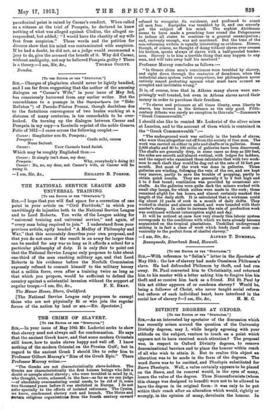[To THE EDITOR Or THE "SrEcTATorc.'] SIR,—It was Pompeia, not
Calpurnia, whom Caesar divorced. There are different translations regarding the historic quota- tion. The "Dictionary of Quotations" gives the following as from Plutarch: " Caesar's wife should be above suspicion," while the " Biographie Universelle" gives, " Que la femme do Cesar ne devait pas meme etre soupconnee." Are these not slightly misleading ? The writer assumed from these, as no doubt did others, that Caesar's wife had been calumniated, and was innocent. Pompeia was tried, convicted, and divorced. The English translation from the original Greek of " Plutarch's Lives " reads : "I would have the chastity of my wife free even from suspicion." The former translations are not unfrequent]y applied to virtuous women, thus: " The lady is, like Caesar's wife, above suspicion." The authoris tative version casts a doubt upon the chastity. Would the general translation not be more accurately rendered : " Caesar's wife. was not above suspicion " A curious ethical if not paradoxical point is raised by Caesar's conduct. When called as a witness at the trial of Pompeia, he declared he knew nothing of what was alleged against Clodius, the alleged co- respondent, but added,' " I would have the chastity of my wife free from suspicion." These words and the petition for divorce show that his mind was contaminated with suspicion. If he had a doubt, he did not, as a judge would recommend a jury to do, give the accused the benefit of it. Why did Caesar, without ambiguity, not say he believed Pompeia guilty ? There











































 Previous page
Previous page